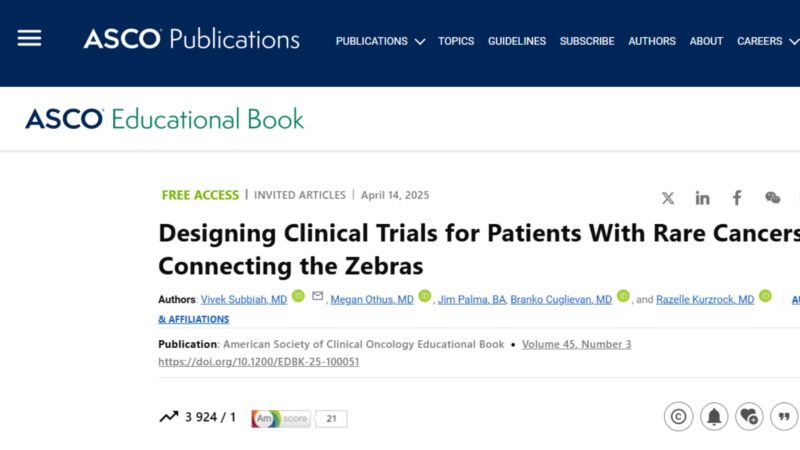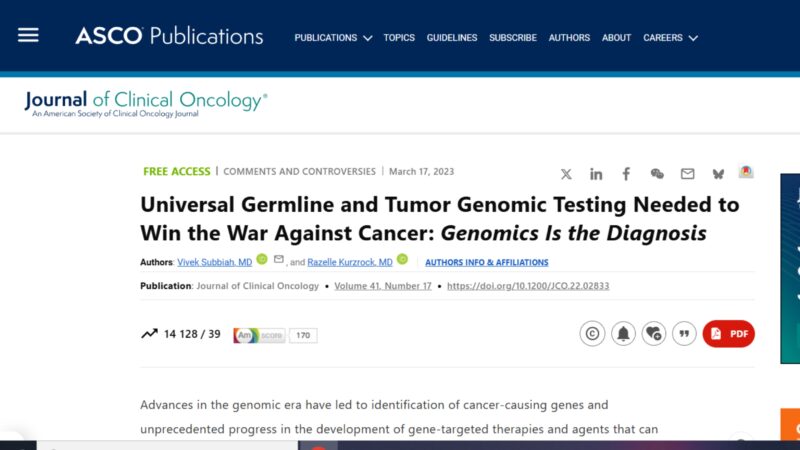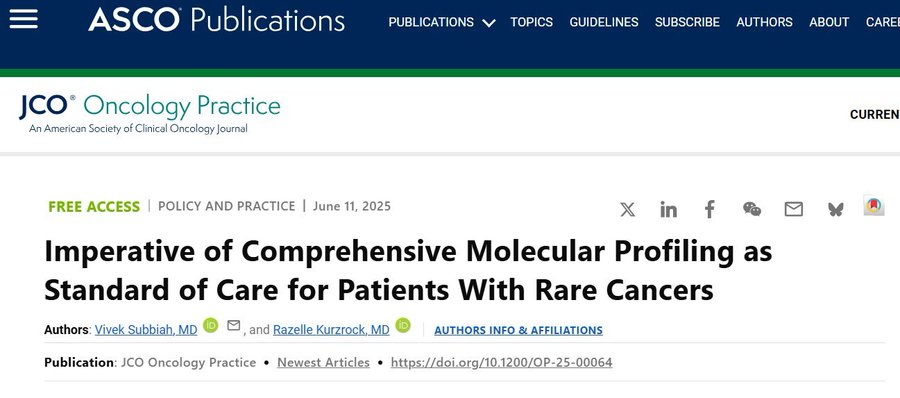
Vivek Subbiah: Why Every Rare Cancer Patient Deserves Molecular Profiling?
Vivek Subbiah, Chief of Early-Phase Drug Development at the Sarah Cannon Research Institute, shared a post on X:
“TWEETORIAL/X’torial: Why Every Rare Cancer Patient Deserves Molecular Profiling?
Here’s a shocking fact: Rare cancers make up 25% of ALL cancer cases, yet most patients never get the molecular testing that could save their lives.
In our policy and practice paper – 20th anniversary of (JCO Oncology Practice) Our position. Comprehensive molecular profiling must be standard care for rare cancers.
Title: Imperative of Comprehensive Molecular Profiling as Standard of Care for Patients With Rare Cancers
Authors: Vivek Subbiah, Razelle Kurzrock
Read the Full Article.
The numbers are staggering: ~200 types of rare/ultra-rare cancers exist Rare = <15 per 100,000 people Ultra-rare = <1 per million/year Yet together they affect millions of patients worldwide. Each deserves a fighting chance.
Here’s the game-changer: The FDA has approved 9 tissue-agnostic therapies that work across cancer types based on molecular features, not where the cancer started. But here’s the catch – you can only access them if your tumor gets molecular profiling (NGS).
Title: The evolving landscape of tissue-agnostic therapies in precision oncology
Authors: Vivek Subbiah, Mohamed A. Gouda, Bettina Ryll, Howard A. Burris III, Razelle Kurzrock
Read the Full Article.

The 9 FDA-approved tissue-agnostic therapies include: Larotrectinib/entrectinib for NTRK fusions. Pembrolizumab for MSI-H tumors
Dabrafenib + trametinib for BRAF V600E
Trastuzumab deruxtecan for HER2+ tumors
Without testing = no access. Read further.Why are cancers rare? Often because there’s only one molecular pathway driving them (vs common cancers with multiple drivers). This makes rare cancers especially good candidates for precision therapy – if we know what to target.
Title: Designing Clinical Trials for Patients With Rare Cancers: Connecting the Zebras
Authors: Vivek Subbiah, Megan Othus, Jim Palma, Branko Cuglievan, Razelle Kurzrock
Read the Full Article.

The cruel irony: Traditional drug development fails rare cancer patients because: Too few patients for large trials Limited commercial incentive Poor understanding of biology No standard of care for control arms We need a new approach.
The evidence is mounting: Studies like DRUP, SAMBA-101, I-PREDICT show rare cancer patients benefit from molecular matching at the same rates as common cancers. Clinical benefit rates: ~33% for both rare AND common cancers when matched to therapy.
But isn’t molecular testing expensive?” Nope! Costs have plummeted. Studies show precision medicine approaches result in: 22% lower costs 1.3 years longer survival It’s actually more expensive not to test.
Current reality check: Even for lung cancer with 10 known targets, NGS utilization is shockingly low. For rare cancers? Even worse due to: Limited awareness Inconsistent guidelines Access disparities Reimbursement challenges.
Professional guidelines exist but they’re: Complex and inconsistent Leave most rare cancers “orphaned” Create confusion for oncologists We need harmonized, clear guidance: Test all rare cancers.
Success stories matter: Some patients with MSI-H or high TMB tumors achieve long-term complete remissions – essentially cures – even with metastatic disease. These outcomes are only possible with molecular profiling.
What should happen at diagnosis for every rare cancer patient: Comprehensive NGS (mutations + fusions) HER2 testing by IHC Germline testing when indicated Results reviewed by molecular tumor board This should be standard, not optional.
Title: Universal Germline and Tumor Genomic Testing Needed to Win the War Against Cancer: Genomics Is the Diagnosis
Authors: Vivek Subbiah, Razelle Kurzrock,
Read the Full Article.

The bigger picture: Collecting molecular data from rare cancer patients:
Advances our understanding. Drives research for new therapies. Helps future patients. Builds the learning healthcare system we need. Every test matters.Bottom line: Comprehensive molecular profiling isn’t just “nice to have” – it’s an imperative for rare cancer patients. It’s their pathway to: Accurate diagnosis. Targeted therapies. Clinical trials. Hope for better outcomes.
Call to action: Oncologists: Order NGS for ALL rare cancer patients Payers: Cover comprehensive profiling Patients/families: Advocate for testing Researchers: Continue building the evidence Every rare cancer patient deserves precision medicine.”
-
Challenging the Status Quo in Colorectal Cancer 2024
December 6-8, 2024
-
ESMO 2024 Congress
September 13-17, 2024
-
ASCO Annual Meeting
May 30 - June 4, 2024
-
Yvonne Award 2024
May 31, 2024
-
OncoThon 2024, Online
Feb. 15, 2024
-
Global Summit on War & Cancer 2023, Online
Dec. 14-16, 2023

